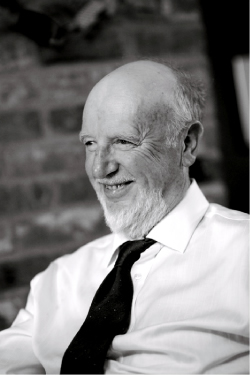Biography
Ivor was recently given the Michael Huberman award at the American Educational Research Association for his work on teachers’ lives; he has just been given an Honorary Doctorate by the University of Gothenburg and made a Laureate of the Phi Delta Kappan Society in the USA.
He is currently working on a research project entitled 'Research Challenges' for the University of Brighton and is a partner on the RIAIPE III project 'Programa Marco Interuniversitario Para Una Política De Equidad Y Cohesión Social En La Educación Superior' research project – funded by the EU and looking at equality and social inclusion in Latin America.
He has also recently completed three major research projects for the EU, ESRC and AHRC.
Ivor Goodson grew up in a village on the outskirts of Reading in Berkshire. His parents were working people: his father was a gas fitter and his mother worked in a munitions factory for a period and later as a dinner lady.
He trained in economic history at the University of London and conducted doctoral work on Irish immigrants in Victorian England. However he became increasingly drawn to the new comprehensive schools that were being built by the Labour government that had been elected in 1964 and in 1969 went back to train as a teacher at the Institute of Education in London. In 1970 he began teaching in comprehensive schools and taught history and social studies. The schools he taught in, Countesthorpe and Stantonbury Campus, were leading innovative comprehensive schools. The focus was on developing alternative pedagogies which would further social inclusion.
Ivor is the Founding Editor of the Journal of Education Policy which he currently co-edits with Stephen Ball and Meg Maguire. This journal recently celebrated its twenty-fifth anniversary with an international conference at the Institute of Education in London.
Frustrated by the barriers to innovations aiming at social justice he returned to the University of Sussex to study the historical patterns which underpinned barriers to social inclusion. His PhD on this subject explored the construction of school subject knowledge and its relationship to social processes. This led to his first book School Subjects and Curriculum Change which is now in its 3rd edition. Following that book which was published in 1983 he produced a series of books which aim to explore the curriculum as a site of social contestation and social distribution. The series Studies in Curriculum History was commissioned by Falmer Press in 1984 and led to the publication of over 20 books which established the history and sociology of curriculum construction, not just in the United Kingdom but around the world. His own contributions to the series the books Defining the Curriculum, The Making of Curriculum, Studying School Subjects and Subject Knowledge formed a corpus of books which elaborate the relationship between curriculum and society but also provide ‘how to do’ guidance on the nature of curriculum study using the historical focus.
Alongside his work on curriculum he began to develop a range of qualitative methodologies focussing on life history approaches. The first book Biography, Identity and Schooling co-authored with Rob Walker sought to explain how life history methods could connect our understanding of personal motives and missions to wider social movements and processes. In particular his work explored the relationship between teacher’s life purposes and their work. The pioneering book Teachers Lives and Careers published in 1985 and co-edited with Stephen Ball opened up a new field of study focussing on the teachers’ life and work. This was followed by Studying Teachers Lives published in 1992 which took further the focus on teachers’ lives and explored both the methodologies and the substantive findings emerging in this field. One of his recent books Professional Knowledge, Professional Lives looks at how understanding the teachers’ life and work provides new insights into why reform initiatives succeed or fail. This book is the result of a large 4-year Spencer Foundation project on stability and change in schooling focussing on the United States of America and Canada. Ivor was given the Michael Huberman Award in San Francisco at the American Education Research Association in 2006.
Most recently Ivor has been involved in large research projects on people’s life histories. ‘The Learning Lives’ project funded by the Economic and Social Research Council studied people’s learning experiences across the life course and led to the book Narrative Learning. The theoretical insights generated by this and the ‘Professional Knowledge’ project funded by the European Union led to the book Developing Narrative Theory. Ivor was made ‘Author of the Month’ in October 2011 by Routledge Education.
Many of his books are available in translation and have been published in Japan, China, Sweden, Norway, Finland, Brazil, Paraguay, Argentina, Ireland, Portugal and Spain. Currently his collective works are being translated into Spanish, Chinese and Japanese.
